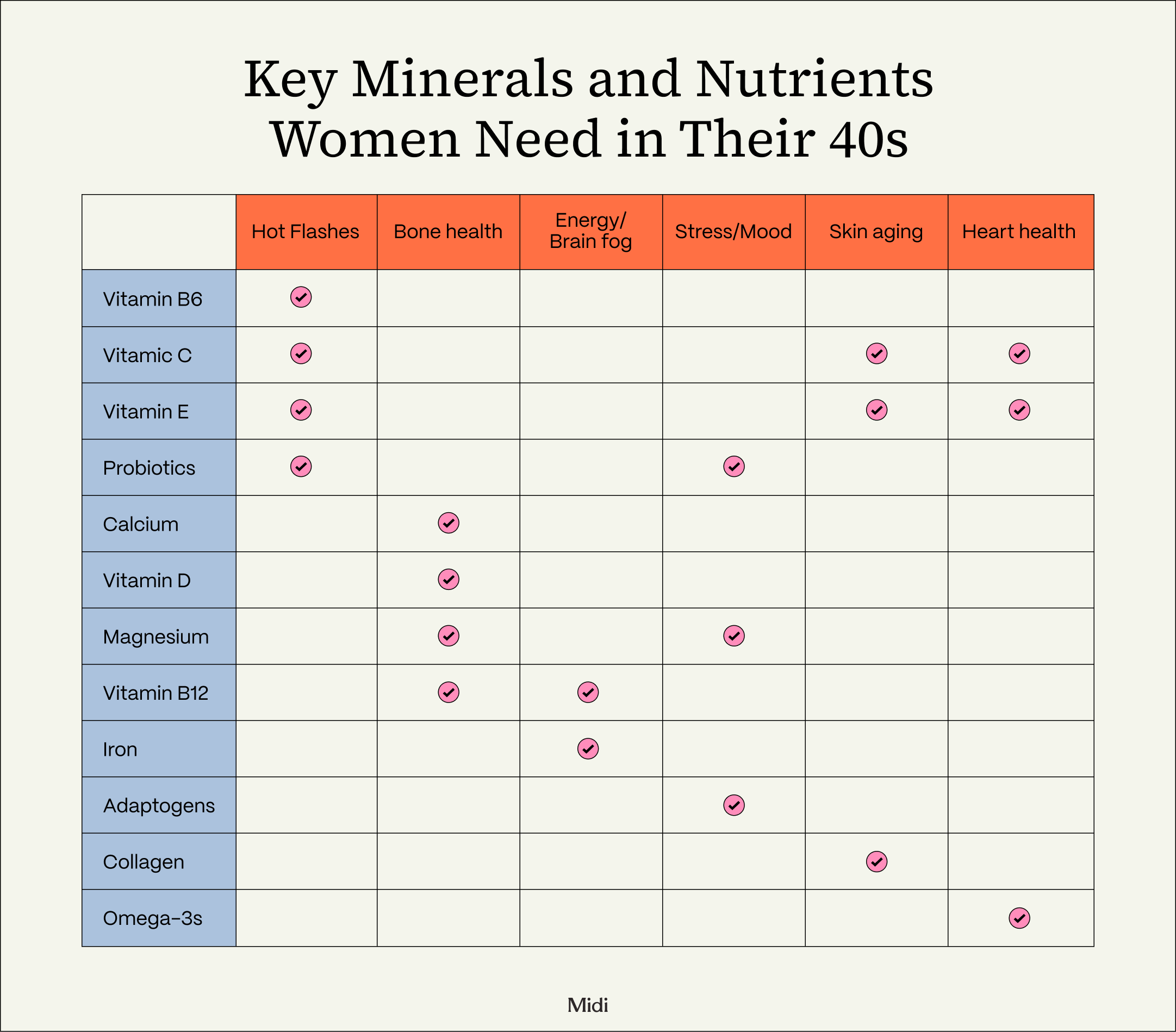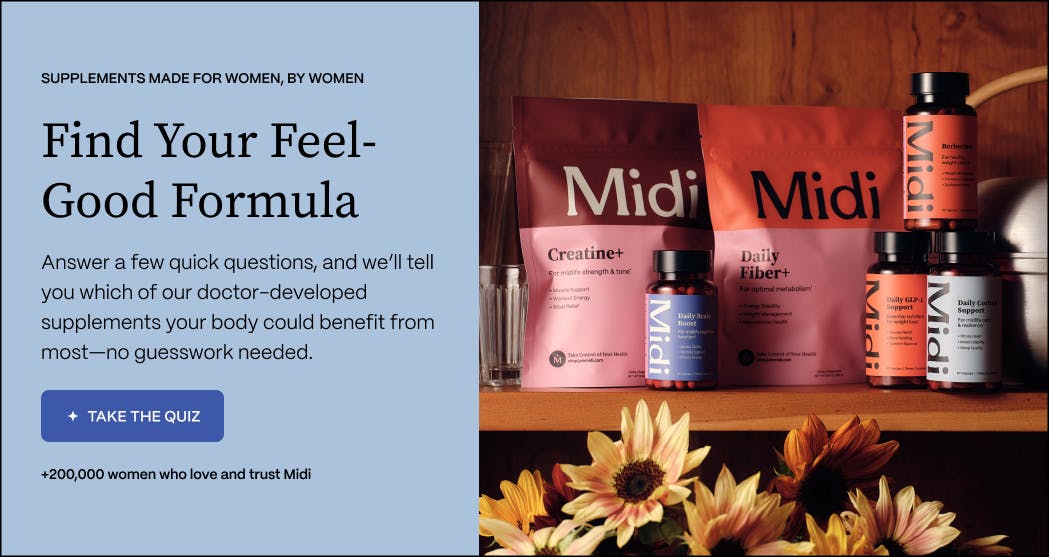File this under things no one tells us: The vitamins women should take daily in their 40s, especially during perimenopause and menopause, can differ from the vitamins you took in your 20s and 30s. While some may be the same, hormonal changes often call for a different regimen. So, if you're wondering, What vitamins should I take daily as a woman in my 40s?, you've come to the right place.
Read on to learn about common nutrient gaps, changing dietary needs, and supplements that may help reduce menopause symptoms. And remember: You don't have to figure this out on your own. Working with a healthcare professional, like a Midi clinician, can help you determine which supplements are really worth taking and which ones you can skip.
If you feel different these days—lower on energy, with the sneaking suspicion that your metabolism is taking a dive and fine lines that are multiplying, not to mention a mood that feels up and down (and angry)—you may be asking: Is there a supplement for that?
Although supplements don’t take the place of healthy lifestyle habits, they can be a valuable tool for energy, health, and longevity support. Here, we've compiled clinician-recommended guidance on the vitamins, minerals, and other supplements that may help you as you navigate perimenopause.
Why Vitamins and Supplements Matter After 40
Thanks to shifting hormones, prominent life changes, and elevated health concerns in menopause, you may have unique nutrient needs in your 40s, compared with earlier decades of your life. Targeted supplementation can enhance your overall health and address specific age-related concerns, such as stress, reductions in bone density, low energy, trouble with sleep and mood, and more.
Essential Daily Vitamins for Women Over 40
Below, you’ll find our list for some of the top nutrient gaps to keep on your radar. While you probably won’t need them all, this is a good starting point to go over with a healthcare professional, like a Midi clinician.
Vitamin D
Unless you regularly eat fatty fish like salmon or take cod liver oil, you may be lacking in vitamin D, aka the sunshine vitamin. Research suggests up to 70% of women over age 40 have low vitamin D levels, which potentially increases the risk of depression, osteoporosis, type 2 diabetes, and even cancer. Your vitamin D status can be analyzed with a simple blood test. Depending on your diet or where you live, your clinician may recommend adding a supplement to your daily regimen.
Vitamin B12
Brainpower on the fritz lately? Low B12 is linked to cognitive dysfunction and decline. In addition, skimping on the nutrient may also be associated with low bone mineral density and, thus, a higher risk of fracture. For postmenopausal women, reduced stomach acid and intrinsic factor—both needed for B12 absorption in the stomach—can make it harder for the body to maintain adequate levels.
Vitamin B6
Your body calls on vitamin B6 for more than 100 enzyme reactions that control your metabolism. And there’s an added perk for B6—possibly less severe hot flashes, according to one study. B6 may take part in a process that regulates the activity of neurons involved in triggering hot flashes. B6 is available in chickpeas, cottage cheese, poultry, fish, potatoes, and bananas.
Vitamin C
Vitamin C helps the body produce collagen and neurotransmitters, is involved in protein metabolism and immune function, and is an antioxidant that quells free radicals that contribute to aging and diseases. Plus, vitamin C may also help reduce hot flashes, improve bone density, boost brain function, and protect the heart with its antioxidant properties.
Vitamin E
Another powerful antioxidant, vitamin E has been analyzed for its ability to help relieve symptoms of menopause. Although vitamin E wasn’t as powerful as the other E (estrogen) in a review of 16 studies, the researchers found that vitamin E favorably affects postmenopausal hot flashes and vaginal changes, plus improves blood lipids and blood vessel health. The conclusion? Vitamin E could make a fine add-on treatment to hormone therapy in menopause.

Key Minerals and Nutrients Women Need in Their 40s
Getting a range of minerals and other nutrients like essential fatty acids through eating a variety of foods in your diet is key to health at any age. When you’re in midlife, there are a few that you should ensure you’re getting enough of:
Calcium
Bone health is a big concern as you enter into menopause. About half of women over age 50 will break a bone due to osteoporosis (a disease where bones weaken). Your bones store calcium, and your bone density is based on the concentration of minerals like calcium in your bones.
Unfortunately, 9% of women don’t have adequate amounts of calcium in their diet. Calcium is found in dark leafy greens, dairy (if you tolerate it), small fish like sardines, tofu, and fortified foods.
Combining a supplement with dietary sources of calcium allows you to meet the recommended dietary allowance (RDA) for calcium while also taking in other nutrients, like fiber and vitamin D, that these foods provide.
Magnesium
You can think of magnesium as an anti-stress mineral. Magnesium is involved in the body’s stress response, but the catch is, stress “uses up” magnesium in the body, leading to lower levels. And lower levels promote stress vulnerability. This stress cycle is not one you want to get stuck in.
With menopause being a time of increasing stress, you may need magnesium now more than ever. The mineral is also an electrolyte that helps muscles relax, plays a role in bone health, and regulates mood.
Iron
In menopause, you don’t necessarily need more of every nutrient. Iron is a great example of this. When you’re in perimenopause and having periods, you’ll still need 18 mg of iron daily. After menopause, however, when you stop bleeding, you don’t need as much iron, so your needs go down to 8 mg per day.
If you are postmenopausal, in general, it’s not recommended to supplement with iron, as excess iron during this time can harm your pancreas, liver, heart, and joints. Still, adequate amounts are needed to maintain proper energy levels.
Omega-3 Fatty Acids
In midlife as you enter into the menopausal transition (or face it), your risk for cardiovascular disease will rise. (Estrogen, the levels of which fall in menopause, protects your heart by helping keep cholesterol in a healthy range, promoting blood vessel function, and neutralizing damaging free radicals.) Omega-3 supplements can—ahem —supplement the fatty acid–rich foods you’re already eating, like fatty fish (tuna, salmon, lake trout), flaxseeds, soybeans, and walnuts.
Fiber
Perhaps you’ve heard this before, but it bears repeating: Fiber is vital! Eating fiber-rich foods—and supplements can fill in the gaps, if necessary!—can help you lose weight; keep you fuller longer; and feed the good bacteria in your digestive tract, which also supports better health in many ways. Midi’s Daily Fiber+ also includes chromium picolinate, which can help improve blood sugar, and has both soluble and insoluble fiber, as well as green banana powder, a prebiotic starch that boosts good bacteria.
Best Multivitamin for Women Over 40: What to Look For
Overall, multivitamins are generally safe. As a woman in midlife, you have several options for choosing a multi:
- a general multivitamin from a reputable brand
- a multivitamin formulated for women
- a multivitamin formulated for women age 40-plus
Each of us has unique nutrient needs, so one choice isn’t necessarily the best for every woman in perimenopause. If you know your specific nutrient concerns, you can let that info guide you to finding the best multivitamin for you. Be sure to flip the product over and read the Supplement Fact panel to ensure that the nutrients you’re looking for are there in amounts that make sense for you.
If needed, you can ask your clinician how to incorporate a multi into your Care Plan. Also inquire about any concerns with your body’s ability to absorb certain vitamins. For example, some formulas contain methylated B12, which is the active form of B12 that’s easier for certain bodies to use.
Beyond that, be sure to buy a multivitamin from a brand that uses third-party testing. This is independent testing of the supplement and verifies label accuracy and a lack of contaminants like heavy metals.
Supplements to Consider for Enhanced Health After 40
Depending on your diet, health risks, and other personal factors, a few other supplements may be appropriate for you in your care plan.
Probiotics
Probiotics are microorganisms present in fermented foods like yogurt and kombucha, and you can also take them as a supplement. The best probiotics for women are ones that promote “good” gut microbial health and diversity, which has a full-body impact in terms of digestive health and immune response. And a meta-analysis including seven studies found that probiotics are uniquely helpful in the menopausal transition, being associated with reduced menopausal symptoms (including slight reductions in hot flashes and night sweats, vaginal dryness, and mood changes). More research is needed, but the authors conclude that probiotics could be a complementary part of an overall care plan for menopause.
Collagen supplements
For many of us 40-somethings who are spiritually in their 20s, looking into the mirror can reflect back an inaccurate image of yourself. She appears older, while inside she is not. And while aging is natural and wonderful, taking hydrolyzed collagen supplements may be one natural step toward helping reduce skin aging by improving hydration and elasticity to lessen the appearance of wrinkles and sagging, according to a 2023 review. Plus, collagen is also good for joint health and may help reduce pain.
Creatine
Creatine is an amino acid–based compound that helps power muscles and brain function, and women naturally produce less of it than men. This makes supplementation particularly beneficial during perimenopause and menopause. When combined with strength training, taking 3 to 5 grams daily of creatine monohydrate can help improve muscle strength, support bone health, reduce brain fog, and potentially boost mood.
Berberine
This substance comes from the berry of the berberis shrub, and it has been shown in some studies to help lower blood sugar levels and improve cholesterol levels—two issues that can be tricky for women in perimenopause and menopause. Midi's Berberine+ supplement is designed to stimulate the release of glucagon-like peptide-1 (GLP-1) from intestinal cells, helping lower blood sugar and boost production of insulin.
Adaptogenic Herbs
Many plants are considered adaptogens, which include substances that boost your body’s resilience to stress and fatigue. Some examples are ashwagandha, magnolia bark extract, rhodiola, and ginseng. When included as part of a well-rounded care plan, adaptogens can help ease some of the most common symptoms in perimenopause, like poor sleep, anxiety, and mood symptoms. One study found that ashwagandha treatment reduced overall symptoms of menopause–including hot flashes—more effectively than a placebo, possibly due to mood support and increased estrogen levels.
Supplements for Cognitive Support
One of the most am-I-losing-my-mind symptoms of perimenopause and menopause is brain fog. Increased bouts of forgetfulness in your 40s are as common as they are frustrating. For this reason, many women in their 40s want to boost mental clarity and cognitive function with supplements that help ease menopause brain fog. Science-backed ingredients to look for:
- The phospholipid phosphatidylserine, is a brain-supportive nootropic—a substance that reduces mental fatigue while supporting cognitive function, stress recovery, and working memory under pressure.
- Choline, a nutrient essential for making acetylcholine, is a the neurotransmitter that’s vital for learning, formation of memories, and cognitive flexibility.
- Coenzyme Q10 (CoQ10) supports your body’s mitochondria—aka the energy center of the brain—to boost brain and heart health by enhancing cellular energy and offering antioxidant protection.
- L-theanine, an amino acid that research shows can promote relaxation without drowsiness.
Common Mistakes Women Make with Vitamins and Supplements
One of the things you might notice about health content on social media is that a lot of fit midlife women showcase themselves knocking back a handful of supplements each day. That’s certainly not necessary for everyone and may not be recommended for you.
That’s why we recommend connecting with a clinician who can personalize supplement recommendations to your health. This way, you can take supplements that you need, leave others behind, and avoid the pitfall of taking overlapping or unnecessary supplements.
That also speaks to the common mistake of taking a supplement because someone else uses it and recommends it. By following your personalized needs based on your diet, health status, and lifestyle, you can create a supplement regimen that’s specifically tailored to you—and will move the needle for your wellness in a meaningful way.
Lastly, the supplement industry has been called the Wild West, and that’s completely true. Not all supplement companies are in it to protect or enhance your health, so remember to follow the third-party verification rule for evaluating effective, safe supplements. And don’t be shy about asking your clinician for supplement recommendations, including brand, dosage, and how to evaluate if it’s working for you.
Key Takeaways
- As hormones shift at the onset of perimenopause and menopause, women may have unique nutrient needs in your 40s, compared with earlier decades of their life.
- Targeted supplementation can enhance overall health and address specific age-related concerns, such as stress, reductions in bone density, low energy, trouble with sleep and mood, and more.
- Although supplements don’t take the place of healthy lifestyle habits, they can be a valuable tool for energy, health, and longevity support.
Frequently Asked Questions (FAQs)
What vitamins should a 40-year-old woman take?
There are no specific requirements for a woman in her 40s. Your vitamin regimen should be based on what your body needs, and some possible nutrient shortfalls in midlife include vitamin D, calcium, magnesium, and B12. For some women, taking a multivitamin can help cover their bases if their diets are lacking.
Which two vitamins should not be taken together?
If you take a multivitamin and calcium supplement, take these apart from one another, as calcium can affect nutrient absorption of minerals like iron, zinc, and magnesium. Another combo to watch out for is vitamin C and B12, as C can impact B12 absorption.
What are the top 5 vitamins a woman should take?
There are no “musts” when it comes to supplementation, since a well-planned diet may be able to provide adequate nutrients for your body. However, ask your clinician if they think you might benefit from supplementing with calcium, vitamin D, vitamin E, vitamin B12, and magnesium.
Which supplement is best after 40 years of age?
It’s tough to pick a single best supplement at 40-plus, which is why personalized recommendations from a menopause-trained clinician is so important. For some midlife women, a multivitamin may cover your bases, while for others, a probiotic may be advised to support digestive health or an adaptogen may be helpful for mood and stress support.
That said, one of the biggest nutrient gaps perimenopausal women face is with calcium and vitamin D intake, which is needed to keep your skeleton strong as you age and avoid the fractures that so many women experience after menopause. The bottom line: Have a thorough talk with a trusted clinician, who can give you the time and attention you need to make the best health choices for you.
If you’re in perimenopause or menopause and want guidance from clinicians who specialize in women’s midlife health, book a virtual visit with Midi today.
Hormonal change is at the root of dozens of symptoms women experience in the years before and after their period stops.
Our trained menopause specialists can help you connect the dots to guide you towards safe, effective solutions.
Whether you need personalized guidance or a prescription routine to tackle symptoms—including vaginal dryness and irritation, brain fog, hot flashes, sleep trouble, mood swings, and weight gain—we’ve got you covered.
Midi’s mission is to revolutionize healthcare for women at midlife, wherever they live and whatever their health story. We believe that starts with education, to help all of us understand our always-changing bodies and health needs. Our core values guide everything we do, including standards that ensure the quality and trustworthiness of our content and editorial processes. We’re committed to providing information that is up-to-date, accurate, and relies on evidence-based research and peer-reviewed journals. For more details on our editorial process, see here.

 Claudia Levine, MD
Claudia Levine, MD







